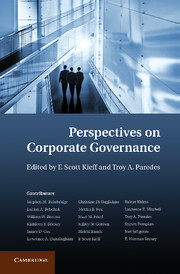Book contents
- Frontmatter
- Contents
- Contributors
- Acknowledgments and Dedication
- PERSPECTIVES ON CORPORATE GOVERNANCE
- Introduction
- PART ONE THE BOARD OF DIRECTORS AND THE CEO
- PART TWO THE WHY, WHEN, HOW, AND HOW MUCH OF EXECUTIVE PAY
- PART THREE CONSTRAINING MANAGERS AND DIRECTORS: INVESTORS, SECURITIES REGULATION, AND THE MEDIA
- PART FOUR DELAWARE VERSUS CONGRESS: ON THE FEDERALIZATION OF CORPORATE GOVERNANCE
- PART FIVE COMPARATIVE CORPORATE GOVERNANCE
- Epilogue: Three Secular Trends of Corporate Law
- Index
- References
Epilogue: Three Secular Trends of Corporate Law
Published online by Cambridge University Press: 04 August 2010
- Frontmatter
- Contents
- Contributors
- Acknowledgments and Dedication
- PERSPECTIVES ON CORPORATE GOVERNANCE
- Introduction
- PART ONE THE BOARD OF DIRECTORS AND THE CEO
- PART TWO THE WHY, WHEN, HOW, AND HOW MUCH OF EXECUTIVE PAY
- PART THREE CONSTRAINING MANAGERS AND DIRECTORS: INVESTORS, SECURITIES REGULATION, AND THE MEDIA
- PART FOUR DELAWARE VERSUS CONGRESS: ON THE FEDERALIZATION OF CORPORATE GOVERNANCE
- PART FIVE COMPARATIVE CORPORATE GOVERNANCE
- Epilogue: Three Secular Trends of Corporate Law
- Index
- References
Summary
I feel a little bit like I'm Huck Finn at my own funeral. I've never heard so many kind words, and it's been deeply moving. I've had to pinch myself occasionally to remember I'm still alive. I do want to note, for the record, that while I'm becoming a university president, I'm still going to play a role in securities law. This has been my life as a scholar since I began many years ago, and I'm looking forward particularly to working with Troy Paredes on the fourth edition of the Securities Regulation treatise, what will now be the Loss, Seligman, and Paredes treatise.
The greatest joy of my academic life has been my friends. To see the number of colleagues in this room is especially moving. Harvey Goldschmid, for example, whom I met my first day on the job in August of 1974 at a conference that Elliot Weiss helped organize, provides a sense of continuity for my entire career.
Since the purpose of this conference is to reflect on the new corporate law, let me offer a few thoughts on where we are going by addressing three secular trends, which in the decades to come will have a good deal to do with the development of corporate governance standards.
The first general trend of corporate governance has been the growing irrelevance of state corporate law. This trend dates back decades. It is a study in abdication.
- Type
- Chapter
- Information
- Perspectives on Corporate Governance , pp. 459 - 466Publisher: Cambridge University PressPrint publication year: 2010



